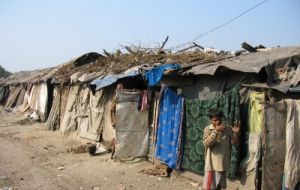MercoPress. South Atlantic News Agency
Rural poverty remains strong in Latin America in spite of agriculture boom
 Most of Latin America’s poor and indigent are concentrated in rural areas
Most of Latin America’s poor and indigent are concentrated in rural areas Agriculture in Latin America and the Caribbean has had a dynamic development growth during this decade but it has not been sufficient to reduce rural poverty in the region according to a report from FAO and the UN Economic Commission for Latin America and the Caribbean, Cepal.
“The levels of poverty and indigence in rural areas of the region remain high and have fallen from 60 to 52% is spite of the agro-export boom and the surge of farming”, points out the report jointly elaborated and released over the weekend.
Under the heading of “Farming boom and persistence of rural poverty”, the numbers show that this has happened because the boom in agriculture has concentrated in a few products, has been restricted to certain regions and is dominated by a reduced number of big corporations.
Besides farming in the region continues to have a deficit in decent jobs’ creation, which means informality, low pay, virtually no access to social security and little respect for labour rights.
FAO and Cepal consider the document as “pioneer” from the moment they link rural employment with poverty. This because of the lack of concern about rural jobs both from academia and politics in the region, points out the document.
The leading hypothesis of the study confirmed by the document is that conditions of the labour market in rural areas help to explain the framework of poverty in which that population lives and is employed.
This is basically linked to the weakness of the outlay and weakness in enforcing labour market institutions such as minimum wage, social protection, union organizations and the forms of contracting, among other things.
Besides other factors help to reproduce rural labour poverty such as minors working and discrimination towards women. Other factors are internal and international migrations and the labour certification methods for the different produce.
The report which also analyzes rural indigence in the region points to the distribution by geographical area which is not homogeneous from the moment that 34 million indigents are reported in rural areas, that is half of the total number of indigents, when only 22% of the total population in Latin America and the Caribbean live and work in the rural sector.
Only in Brazil, Chile and the Dominican Republic the percentages of indigence in urban areas is greater than in rural zones. In the rest of the countries indigence is above all rural. Furthermore the incidence of total poverty is even greater in rural areas with 37%, while in urban areas it stands at 13% according to FAO and Cepal.
Obviously the landscape difference is great and the percentages of rural poverty vary from 12% in Chile to 79% in Honduras and indigence between 4% and 62% in the two same countries considered.
The report also underlines that for the first time in 2007, the world ceased to be eminently rural and today over half of the world population lives in urban areas. The lack of good farmland, non attractive employment conditions in agriculture and the better access to basic services in cities help to explain to a great extent why people abandon the camp for urban areas.
In Latin America for several decades now the rural population has been a minority and currently only 22% live in rural areas, but they add up to an estimated 120 million people, which is not a number to neglect since this is where poverty is greater.
“Rural poverty has been decreasing during the last decades, but even so, a third of the people that inhabit rural areas are poor, almost 100 million people”, concludes the FAO-Cepal report.




Top Comments
Disclaimer & comment rulesCommenting for this story is now closed.
If you have a Facebook account, become a fan and comment on our Facebook Page!